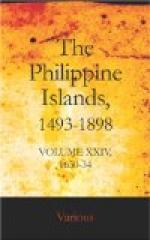Another section relates to general affairs of government. Cerezo again points out the importance of the trade with China and Japan. The relations of Manila, however, with Japan are no longer friendly—a condition of affairs for which the governor blames the “zeal without discretion” of certain religious who, disobeying the royal decrees, go to Japan as preachers. He asks the king to command the religious orders to send no more friars to that country. The trade with China is falling off, mainly because the Portuguese of Macao have absorbed much of it. Cerezo recommends that their trade with Manila be prohibited. He comments on the scantiness of the male population; commends the administration of Rojas, the royal inspector; and makes some minor recommendations to the king.
In regard to the public revenues, Cerezo states that the treasury is burdened with debts; the shipyards are bare of supplies; and the contraband trade with Mexico has attained large proportions. To check this latter evil, the governor recommends that all money sent to Manila be openly registered at Acapulco, imposing on it a duty of five per cent; and a different system of inspecting the Philippine cargoes there be adopted.
In compliance with royal command, the archbishop of Manila reports (August 3, 1634) on the public bakery at Manila. He finds it well built and managed, and recommends that all ovens in the city should be merged in this bakery.
A Jesuit letter from Manila (August 20, 1634) gives interesting news from Japan. The persecution there is still very cruel, and many missionaries have been arrested lately; but the emperor is becoming for the time more lenient, through the influence of certain omens and of his cure from an illness through the prayers of the captive missionaries. The writer hopes, therefore, that Iyemidzu “may be the Constantine of the church” in Japan.
The annual report of Governor Cerezo for 1634 begins with affairs of the revenue. The treasury officials refuse to obey the orders left for them by Rojas; the governor therefore arrests them, which soon brings them to terms. Nevertheless, he excuses their disobedience to some extent, on account of the rigorous and difficult nature of Rojas’s orders; he instances some of these which embarrass both himself and the royal officials. The king has ordered an additional duty to be levied on goods exported to Nueva Espana; the citizens object to paying this, and finally the matter is temporarily settled by a council of the authorities, both civil and religious, until the home government can take action. The governor reports that the royal visitor Rojas did not really accomplish much for the treasury; but exaggerated his own services. He also reminds the king of his former suggestion for checking the illegal despatch of money to Filipinas.




